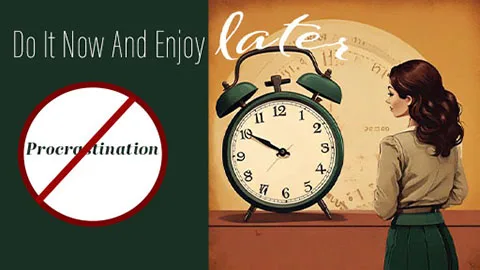
Procrastination: Why We Do It, What It Is, and How to Stop It
Procrastination is something we all encounter, whether it’s delaying a work deadline, avoiding a workout, or putting off organizing a task. But why do we do it?
What is Procrastination?
Procrastination is the act of delaying or postponing tasks, often by focusing on less important or easier activities. It’s not just about being lazy or disorganized. Instead, procrastination is often deeply linked to our emotions, behaviors, and mental processes. It’s a coping mechanism that protects us from uncomfortable feelings, like fear of failure, perfectionism, or even anxiety about the task at hand.
Why Do We Procrastinate?
There are several psychological factors behind procrastination:
- Fear of Failure or Perfectionism: People who procrastinate often fear that they won’t do something well enough. The pressure to perform perfectly can cause anxiety, leading to avoidance.
- Lack of Motivation: If the task feels too difficult, boring, or lacks intrinsic motivation, it’s easier to put it off. Without a strong reason to do something, the brain often seeks out distractions for short-term rewards (e.g., checking social media).
- Low Self-Esteem: Procrastination can also arise from doubts about one’s ability. When people don’t believe in their skills, they tend to avoid tasks to prevent confronting their perceived inadequacies.
- Immediate Gratification: The human brain is wired to favor instant rewards. Tasks like cleaning or paperwork may seem less rewarding compared to more immediate pleasures, such as watching TV or eating.
- Decision Fatigue: When we have too many decisions to make, it can feel overwhelming. Procrastination can occur as a way to cope with the stress of making choices, especially when it feels like there is no right or easy decision.
Why I Pace Around Before Writing: A Procrastinator’s Confession
I’ll share with you my experience. Before I sit down to write a blog post, I often find myself drinking more coffee than usual. Usually, I have one cup before I start writing, but on days when procrastination kicks in, I catch myself making two or three. I pace around the house, moving around corners as though I’m preparing for some live performance, as if millions of eyes are on me, waiting for my next word.
It’s funny, but the reality is that this is all just fear. I see that blank page, and for a split second, I think: “What if I don’t have anything valuable to say? What if people won’t like it?”
And sometimes, I feel like a child who doesn’t want to go to school, coming up with excuses to avoid it. Maybe I have a fever…or a stomach ache…or maybe there’s just one more thing I need to check before I start. The truth is, it’s just fear—fear of not being good enough or of the work being imperfect.
But here’s the thing. Once I begin, it’s like a switch flips. The words start flowing, the ideas connect, and before I know it, hours have passed. I forget the time, the distractions, and the fears I had. I’m in the zone, enjoying the process of creation. The delay was never really about the task—it was about confronting that fear of starting. And once I started, the rest just followed.
If you’re struggling with procrastination, remember that the fear is part of the process. But the moment you take that first step, it becomes easier. Just start—because once you do, you’ll realize the hard part was never the task itself. It was just getting out of your own way.
How to Stop Procrastinating
The good news is that overcoming procrastination is possible. Here are some strategies that can help you break free from the cycle of delay:
- Break Tasks into Smaller Steps: Large projects can feel daunting. Break them into smaller, manageable tasks and focus on completing one small part at a time. This makes the process less overwhelming and easier to start.
- Set Realistic Goals and Deadlines: Instead of saying, “I’ll get it done eventually,” set clear, achievable deadlines for each task. Deadlines create a sense of urgency and focus.
- Use the Two-Minute Rule: If a task will take two minutes or less to complete, do it immediately. This can help you tackle minor tasks quickly, which boosts momentum and reduces procrastination.
- Challenge Perfectionism: Perfectionism is a big driver of procrastination. Accept that “done is better than perfect.” Allow yourself to make mistakes and learn from them rather than delaying tasks to avoid imperfection.
- Reward Yourself: Reward yourself for completing tasks. Use incentives that appeal to your desire for immediate gratification, such as taking a break after finishing a part of the project or treating yourself to something enjoyable once the task is done.
- Eliminate Distractions: If you often procrastinate because you get sidetracked, identify your distractions and remove them. Turn off notifications, limit social media access, or create a work environment free of interruptions.
- Understand the Root Cause: Address any underlying emotions driving procrastination, such as fear of failure or anxiety. By understanding why you procrastinate, you can target the emotional barriers that are preventing you from taking action.
Procrastination is a complex behavior rooted in emotional, psychological, and situational factors. But by understanding its causes and implementing practical strategies like breaking tasks down, setting deadlines, and rewarding yourself, you can make real progress in overcoming it. The key is to recognize that procrastination doesn’t have to control your life—and with the right tools, you can take action and regain momentum.




